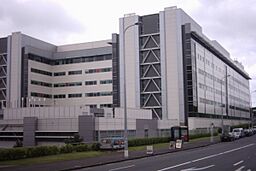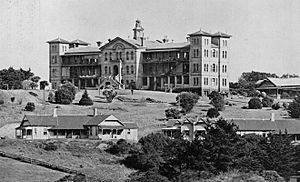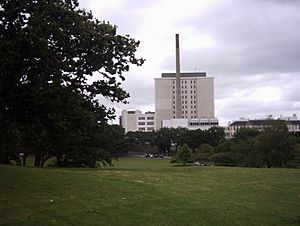Auckland City Hospital facts for kids
Quick facts for kids Auckland City Hospital |
|
|---|---|
| Te Whatu Ora - Te Toka Tumai Auckland | |

The new 2003 section of the hospital
|
|
| Geography | |
| Location | Grafton, Auckland, New Zealand |
| Organisation | |
| Care system | Te Whatu Ora |
| Funding | Public hospital |
| Hospital type | General, teaching |
| Affiliated university | University of Auckland |
| Services | |
| Emergency department | Yes |
| Helipad | (ICAO: NZJL) |
| Beds | 1,171 |
| History | |
| Founded | 1846 |
Auckland City Hospital is a big public hospital in Grafton, Auckland, New Zealand. It is the largest hospital in New Zealand. It is also one of the oldest medical places in the country. The hospital has over 1,100 beds for patients.
It was formed in 2003 by combining four hospitals. These were Auckland Hospital (for adults), Starship Hospital (for kids), Green Lane Hospital (for heart and lung care), and National Women's Hospital (for mothers and babies). Since 2022, Te Whatu Ora – Health New Zealand has run public hospitals in Auckland.
Contents
Why Auckland City Hospital is Important
The hospital's emergency room helps many people. About 47,000 patients visit it each year. Many of these patients stay in the hospital for treatment.
Right next to it is the Starship Hospital emergency room for children. They see about 30,000 young patients every year. This makes the hospital campus one of the busiest in Australasia.
A Place for Learning and Research
Auckland City Hospital is also a place for learning and research. It trains future doctors, nurses, and other health workers. People with rare or difficult health problems from all over New Zealand might come here.
The hospital works closely with Starship Children's Health. Starship is a separate hospital for kids on the same grounds. The hospital is also next to the Auckland Medical School.
History of the Hospital
Early Buildings
The first hospital in Auckland was built in 1847. It was managed by the local government at first. Later, in 1885, a local board took over its management.
In 1877, a new hospital building was finished. It cost about £25,000. This building had an Italianate style. The hospital often helped people who could not pay. Because of this, it was often too full and did not have enough staff.
Things started to change in 1883. A new head nurse, Annie Crisp, was hired. She had trained with Florence Nightingale. Annie Crisp helped turn the hospital into a proper medical facility. She also started real training for nurses.
Current Buildings
The old Italianate building was taken down in 1964. A new building was finished in 1967. This building is still part of the hospital today. It is now called the support building.
The current main hospital building opened in 2003. It cost NZ$180 million to build. It has nine levels, plus one for machinery. This new building is one of New Zealand's largest public buildings. It was designed by Jasmax and built by Fletcher Construction.
From 2001 to 2022, Auckland City Hospital was part of the Auckland District Health Board. On July 1, 2022, Te Whatu Ora – Health New Zealand became the new national health authority. The Auckland District Health Board then became part of Health New Zealand.
Hospital Facilities
The hospital has many different areas for patient care. Here is what you can find on each main level:
- Level 01: Stores medical records and waste.
- Level 02: Has the emergency rooms for children and adults.
- Level 03: For heart care, with general and special wards.
- Level 04: Contains seven operating rooms and intensive care units.
- Level 05: Has the X-ray and scanning center, plus a special unit for stroke patients.
- Level 06: For general medicine, skin problems, infections, and cancer care.
- Level 07: For general surgery, injuries, bone problems, and stomach issues. Also for bladder and breathing problems.
- Level 08: Has 13 operating rooms. Also for brain and nerve care.
- Level 09: Has four operating rooms. Also for care before and after birth, and for newborn babies needing special care.
- Level 10: Contains the plant rooms, which hold things like air conditioning systems.
The support building (the older hospital part) holds offices and support services. It also has physical therapy and occupational therapy. Some patient services and teaching areas are there too. A skywalk connects the support building to the new main hospital building.
Notable Staff Members
- Alice Horsley, an expert in giving medicine to stop pain during surgery.
- Constance Frost, a scientist who studied bacteria and diseases.
See also
- List of hospitals in New Zealand
- Starship Children's Health
- Westpac Rescue Helicopter
- University of Auckland, Faculty of Medical and Health Sciences
 | Sharif Bey |
 | Hale Woodruff |
 | Richmond Barthé |
 | Purvis Young |



